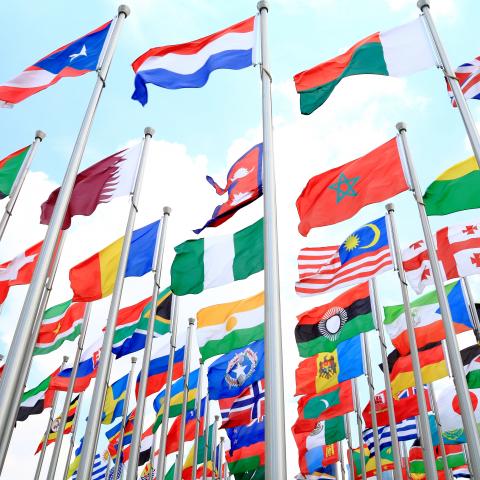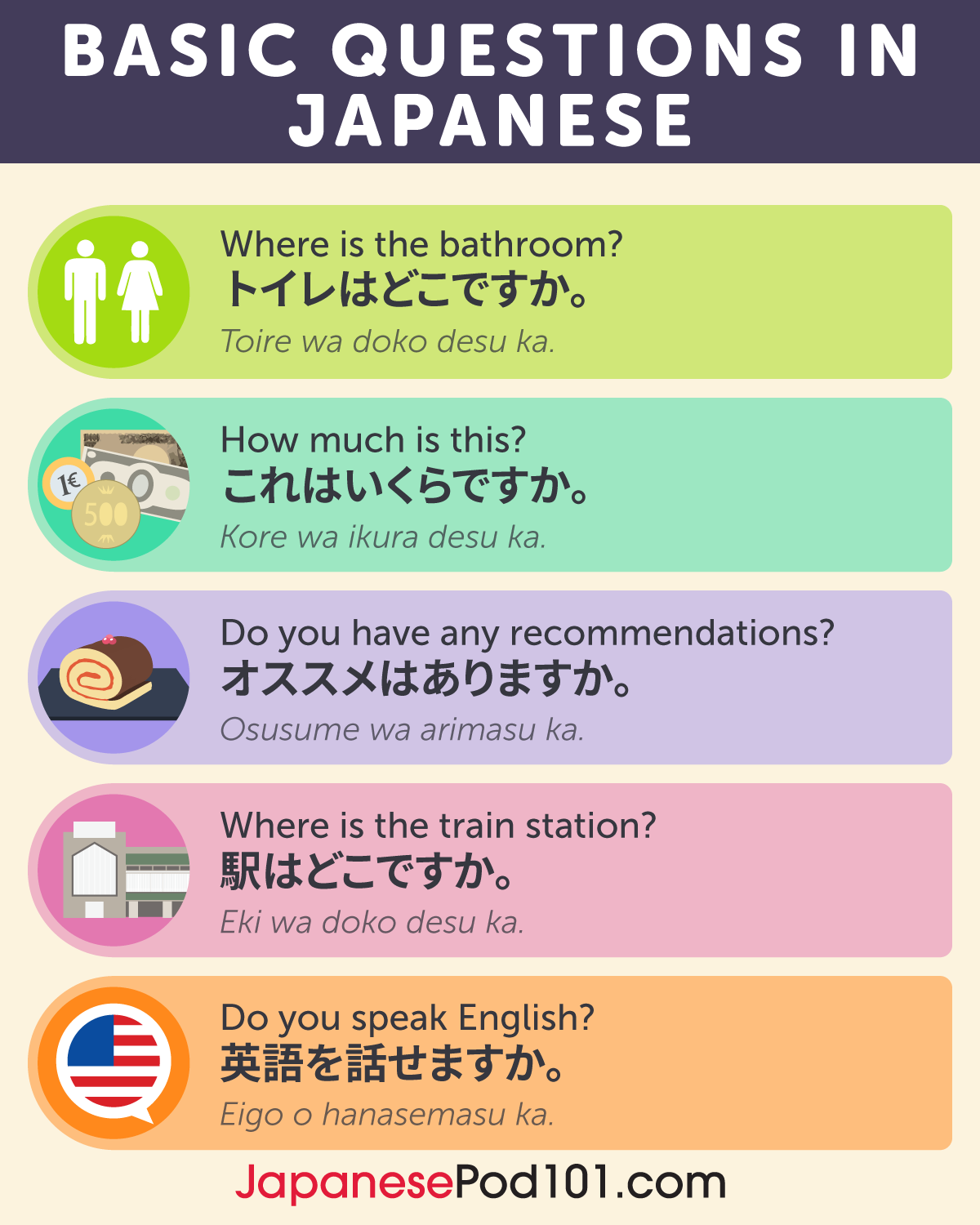Are you traveling to Japan and want to learn practical Japanese travel phrases? This article is designed to help you learn the most useful Japanese words for travel.
It’s always good to learn basic words when you travel to a foreign country. Not only does it make getting around easier, but it also allows you to enjoy communicating with the locals.
In general, Japanese people are not so good at speaking English, free wifi services aren’t very prevalent (especially outside of the central cities), and Japan is still more of a cash-based society than you may think. However, Japanese people are very kind; they’ll listen to you patiently and do their best to help. So just use these basic Japanese travel phrases to talk to Japanese people when you want to ask something.
When you speak even a little bit of Japanese, locals will appreciate your effort and will be more friendly. Here’s JapanesePod101’s list of practical Japanese travel phrases for your travels to Japan!
Table of Contents
- Greeting/Communication
- Asking for Directions
- Shopping
- Restaurants
- When You Need Help
- Conclusion: How JapanesePod101 Can Help You Learn More Japanese
1. Greeting/Communication
To begin our list of essential Japanese travel phrases, we’ll go over greetings and basic travel phrases in Japanese for solid communication. These simple Japanese travel phrases can make a world of difference in your conversations and overall experience in Japan.
1- こんにちは
- Romanization: Kon’nichiwa
- English Translation: Hello
In terms of must-know Japanese travel phrases, you probably already know that this is the most common Japanese greeting word. You can say this to anybody for any occasion during the daytime.
2- はい/いいえ
- Romanization: Hai / Iie
- English Translation: Yes / No
Hai is “Yes” and it’s pronounced like the English word “Hi.” In Japan, saying yes also means that you understand. Iie is “No” and it’s pronounced ‘EE-eh.’
3- ありがとうございます
- Romanization: Arigatō gozaimasu
- English Translation: Thank you
Arigatō gozaimasu is the polite way to say “Thank you” in Japanese, and you can use this for any occasion. In case of a casual situation, you can just say Arigatō, or even more casually, Dōmo (どうも) which means “Thanks.”
4- いいえ、いりません
- Romanization: Iie, irimasen
- English Translation: No, thank you.
It literally means “No, I don’t need it,” in Japanese. At a restaurant, say this phrase when a waiter offers to fill your glass of water and you don’t want more.
5- すみません
- Romanization: Sumimasen
- English Translation: I’m sorry / Excuse me
This word is usually used to say “sorry” or “excuse me”. Say this when you bump into someone in a crowd or when you ask someone for directions. Japanese people also use this to mean “thank you,” in some cases, such as when someone picks up something you dropped.
6- お願いします
- Romanization: Onegai shimasu
- English Translation: Please
When you request something, it’s polite to say Onegai shimasu. When someone offers you something and says please, she/he would say Dōzo (どうぞ) in Japanese.
7- 私はXXです
- Romanization: Watashi wa XX desu.
- English Translation: I am XX.
Watashi is “I,” wa is “am/is/are,” and desu is a present-tense word that links subjects and predicates; it’s placed at the end of a sentence. You can put your name, or your nationality, such as: Watashi wa Amerika-jin desu (私はアメリカ人です) which means “I am American.”
8- 私は日本語がわかりません
- Romanization: Watashi wa nihongo ga wakarimasen.
- English Translation: I don’t understand Japanese.
Nihongo is stands for the Japanese language, and Wakarimasen means “I don’t understand.” If you don’t know something, you can just say Wakarimasen meaning “I don’t know.”
9- 英語を話せますか
- Romanization: Eigo o hanasemasu ka
- English Translation: Can you speak English?
This is one of the most useful Japanese phrases for travelers. Eigo means “English,” Hanasemasu is a polite way to say “I speak,” and ka is a word that you add to the end of a complete sentence to make a question.
10- 英語でお願いします
- Romanization: Eigo de onegai shimasu
- English Translation: English, please.
This is another important Japanese travel phrase. De is the particle, and in this case it means “by” or “by means of.” The phrase literally translates as “English by please.” You can also say M saizu de onegai shimasu (Mサイズでお願いします) which means “Medium size, please.”
2. Asking for Directions
One of the most important Japanese travel phrases you should know are directions. Here are some useful vocabulary words and two Japanese language travel phrases you need to know!
1- Vocabulary
- 駅 (Eki) : Station
- 地下鉄 (Chikatetsu) : Subway/Metro
- トイレ (Toire) : Toilet
- 銀行 (Ginkō) : Bank
- 切符売り場 (Kippu uriba) : Ticket machine/Office
- 観光案内所 (Kankō annaijo) : Tourist information office
- 入口 (Iriguchi) : Entrance
- 出口 (Deguchi) : Exit
- 右 (Migi) : Right
- 左 (Hidari) : Left
- まっすぐ (Massugu) : Straight
- 曲がる (Magaru) : Turn
- 交差点 (Kōsaten) : Intersection
- 角 (Kado) : Corner
2- XXはどこですか
- Romanization: XX wa doko desu ka
- English Translation: Where is XX?
Doko means “where” and you replace XX with the name of where you want to go.
For example
- Toire wa doko desu ka (Where is the toilet?)
- Deguchi wa doko desu ka (Where is an exit?)
3- XX e wa dō ikeba ii desu ka (XXへはどう行けばいいですか) : How can I go to XX?
- Romanization: XX e wa dō ikeba ii desu ka
- English Translation: How can I go to XX?
Dō is “how,” e is “to,” and ikeba ii can be translated as “good to go.” When you want to know how you can get somewhere, replace XX with where you want to go.
For example:
- Eki e wa dō ikeba ii desu ka (How can I go to the station?)
- Ginkō e wa dō ikeba ii desu ka (How can I go to the bank?)
4- Other Examples
1. この道をまっすぐ行きます (Kono michi o massugu ikimasu.):Go straight on this street.
Kono michi is “this street” and ikimasu is the polite way to say “Go.” O is a Japanese postpositional particle which indicates an object (in this case, kono michi).
2. 次の角を右へ曲がります (Tsugi no kado o migi e magarimasu.):Turn right at the next corner.
Tsugi no kado means “next corner” and magarimasu is the polite way to say “Turn.” E is another postpositional particle that indicates direction; this can be translated as the English word “to.”
3. 交差点を渡って左へ行きます (Kōsaten o watatte hidari e ikimasu.):Cross an intersection and go to the left (direction).
Watatte is a conjugated form of wataru which means “cross.”
3. Shopping
You’ll definitely love shopping when traveling in Japan, and some of the best Japanese phrases for travel are those related to this fun past-time. Knowing some useful Japanese words will make your shopping even more enjoyable.
1- XXはありますか
- Romanization: XX wa arimasu ka
- English Translation: Do you have XX?
When you’re at a store and looking for something, you can use this phrase by replacing XX with what you want.
2- いくらですか
- Romanization: Ikura desu ka
- English Translation: How much is it?
This is probably one of the most useful Japanese words for traveling and shopping. You can say Ikura desu ka in many situations, such as when you’re shopping, buying tickets, paying for a taxi, etc.
3- 免税できますか
- Romanization: Menzei dekimasu ka
- English Translation: Can you do a tax exemption?
Did you know that, as a traveler, you can get a sales tax exemption when you purchase things greater than 5,000 yen? Menzei is “tax exempted” and dekimasu means “can do.” Don’t forget to say this when you buy something big!
4- これは何ですか
- Romanization: Kore wa nan desu ka
- English Translation: What is this?
Kore is “this” and nan is another form of nani which means “what.” There are many unique foods, gadgets, and things which are unique to Japan, so when you wonder what it is, point to it and say this phrase.
5- これを買います
- Romanization: Kore o kaimasu
- English Translation: I’ll buy this.
Kaimasu is the conjugation of the verb kau, which means “buy.”
6- カードは使えますか
- Romanization: Kādo wa tsukaemasu ka
- English Translation: Can I use a credit card?
Kādo is “card” and you pronounce it just like the English word “card.” Tsukaemasu is a conjugation of the potential form of the verb tsukau which means “use.” This phrase is useful when you want to use your card at small shops and restaurants.
4. Restaurants
Japan has an array of delicious foods, of which sushi and ramen are just the tip of the iceberg. Amazingly, Tokyo is the city with the most Michelin-starred restaurants in the world, for several consecutive years. Enjoy yummy food at restaurants with useful Japanese words for restaurants and easy Japanese travel phrases related to food.
1- Vocabulary
- 英語のメニュー (Eigo no menyū) : English menu
- ベジタリアンのメニュー (Bejitarian no menyū) : Vegetarian menu
- 豚肉を含まないメニュー (Butaniku o fukumanai menyū) : Menu without pork
- 水 (Mizu) : Water
- 白/赤ワイン (Shiro / Aka wain) : White / Red wine
2- XXはありますか
- Romanization: XX wa arimasu ka
- English Translation: Do you have XX?
When you want to ask if the restaurant has something you want, say this phrase (replacing XX with what you want).
For example:
- Eigo no menyū wa arimasu ka (Do you have an English menu?)
- Aka wain wa arimasu ka (Do you have red wine?)
3- XXをください
- Romanization: XX o kudasai
- English Translation: Can I have XX?
This is another very useful phrase. Simply replace XX with what you want. You can also use this versatile phrase in various occasions, such as when shopping, choosing something, etc.
For example:
- Kore o kudasai (Can I have this?)
- Mizu o kudasai (Can I have water?)
4- お会計お願いします
- Romanization: O-kaikei onegai shimasu
- English Translation: Check, please.
O-kaikei means “check.” In Japan, people often cross their index fingers in front of their face as a gesture to indicate “check, please” at casual restaurants. However, when you’re at a nice restaurant, simply tell a waiter: O-kaikei onegai shimasu.
5. When You Need Help
Sometimes you get faced with unexpected emergencies while you’re traveling. Japan is famous for being one of the safest countries in the world, but you might fall very ill or be caught in a great earthquake.
1- Vocabularies
- 警察 (Keisatsu) : Police
- 病院 (Byōin) : Hospital
- 救急車 (Kyūkyūsha) : Ambulance
- ドラッグストア/薬局 (Doraggu sutoa / Yakkyoku) : Drug Store/Pharmacy
- タクシー (Takushī) : Taxi
2- XXを呼んでください
- Romanization: XX o yonde kudasai
- English Translation: Can you call XX?
When you’re severely ill or in case of emergency, let people know by using this phrase. Japanese people will kindly help you.
For example:
- Yūkyūsha o yonde kudasai (Can you call an ambulance?)
- Keisatsu o yonde kudasai (Can you call the police?)
3- どこでインターネットを使えますか
- Romanization: Doko de intānetto o tsukaemasu ka
- English Translation: Where can I use the internet?
Although large cities in Japan provide free public wifi at major stations, metros, and cafes, you may need to find internet access in smaller cities. Remember that there will be kind Japanese people who will share their personal hotspots, or look things up for you with their own phones, as well.
4- 電話を貸してください
- Romanization: Denwa o kashite kudasai
- English Translation: Can I use your phone?
Denwa is “phone” and kashite is a conjugation word of kasu, which means “lend.” This phrase is literally translated as “Please lend (me) a phone.”
5- 助けてください
- Romanization: Tasukete kudasai
- English Translation: Please help me.
I believe this phrase is the last thing you would ever use in Japan, but in case something does happen, this is useful survival Japanese for tourists.
6. Conclusion: How JapanesePod101 Can Help You Learn More Japanese
I hope this article of Japanese travel phrases is helpful and that you’ll enjoy your trip to Japan!
If you would like to learn more about the Japanese language, you’ll find more useful content on JapanesePod101.com. We provide a variety of free lessons for you to improve your Japanese language skills.
We also have YouTube channel: JapanesePod101. It’s fun to learn Japanese through watching videos and listening to actual Japanese pronunciation, so we recommend you check it out!
Don’t forget to study with our free Japanese vocabulary lists, read more insightful blog posts like this one, and download our mobile apps to learn anywhere, anytime! Whatever your reason for learning Japanese, know that we’re here to help and you can do it! Keep in mind that the best way to learn Japanese phrases for travel is repetition and practice.
Before you go, let us know in the comments how you feel about using these useful travel phrases in Japanese after reading this article. More confident, or still a little confused about something? Feel free to ask questions in the comments!


















